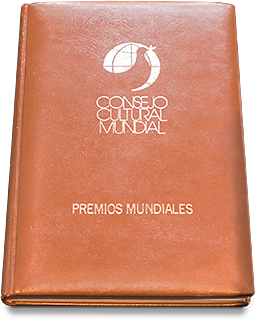WCC
The World Cultural Council (WCC) is an international organization founded in Mexico in 1982 with an initial membership of 124 distinguished scientists and scholars, university presidents and executives from the five continents, including several Nobel laureates.
The Directive Board receives support from private grants through a Board of Trustees and has permanent financial aid from The Global Foundation.
Awards
Since 1984 has annually granted the Albert Einstein World Award of Science and every second year (alternately), the José Vasconcelos World Award of Education and the Leonardo da Vinci World Award of Arts.
Each award consists of a Diploma, a Commemorative medal and an Award Cheque.
Through its awards, it seeks to:
- Promote a culture of tolerance, peace and fraternity by recognizing inspiring role models.
- Recognize excellence as a guiding principle in research, innovation and higher education.
- Inspire future generations by recognizing extraordinary individuals and their achievements.
- Embrace a vision of diversity and mutual respect towards a better world.
Award Ceremonies
The Award Ceremony is hosted yearly, typically in October or November, by a renowned university or academic institute.
Ceremonies can be organized following a proposal from a university or institutional director, particularly in view of the top-ranking academic standards and research work in place; on the initiative of one of our members who would like to host the Ceremony at their own institution; or by invitation from a university that wishes to host the event within the framework of an academic summit, conference or other major academic event.
The ceremony may also includes the presentation of Special Recognitions to a number of young researchers from the host university and country, thus putting them and their work in the spotlight.
WCC Award Ceremonies have proved to be an excellent opportunity for bringing together top-level scientists, educators and researchers from around the world, while showcasing the outstanding achievements of the awardees and inspiring the new generation.
The ceremonies are also a wonderful occasion for disseminating the remarkable achievements of the awardees and acknowledging the inspiration they provide in terms of academic excellence and positive impact on society.
Jury
The members of the WCC comprise the Interdisciplinary Jury, which is currently composed of over 200 members from 35 countries.
New jury members are invited following the recommendation of a current jury member or the institution hosting an Award Ceremony.
The integrity of these awards is bolstered by the fact that the jury is comprised of world-renowned personalities and academic leaders in their respective fields, and includes various Nobel laureates.
The pre-selection and final evaluation process takes approximately six months.
Nominations and Candidate Profile
Nominating Authorities for the Prizes
- The President or Prime Minister of a country
- Ministers of Science and Technology or Culture and Education
- Directors of academic institutes and organizations
- University leaders: Rector, President, Provost or Deans
- Members of the World Cultural Council
Candidate Selection
The WCC annually invites renowned institutions all over the world to submit nominations for the Awards.
Information about the nominees and nominators are confidential.
Nominees for the Albert Einstein World Award of Science should be eminent scientists whose achievements can serve as an inspiration for future generations. Considerations will be given to individuals or institutions in one of the Life Sciences, such as Neuroscience, Earth Science, Biology, Biochemistry, Medicine or Chemistry; or one of the Natural Sciences such as Physics, Mathematics or Astronomy. The prize is awarded every year.
A candidate for the José Vasconcelos World Award of Education should be a renowned educator, an authority in the field of teaching, or someone who has brought about visionary development in education policy. Through their work, the individual or team should have had a significantly positive influence on the quality and reach of teaching and learning in our society. The prize is awarded every second year.
A candidate for the Leonardo da Vinci World Awards of Arts should be a renowned artist, sculptor, painter, writer, poet, cinematographer, photographer, architect, musician or other performing artist, whose work constitutes a significant contribution to the artistic legacy of the world. The prize is awarded every second year.
In addition to considering the candidate’s breakthrough achievements, the jury will also take into account the service which each has made to humankind and their qualities as a role model who inspires future generations to contribute to a better world.
Self-nominations are not accepted. Renomination of previous nominees is possible and encouraged.
Nomination requirements are detailed at nomination form.


